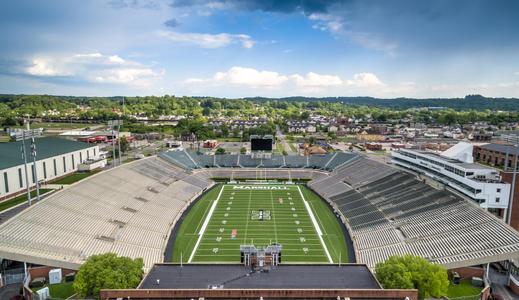Senate Bill 10 – more commonly known as the Campus Carry Bill – has been implemented on all of the state’s higher education campuses since July. But as students begin to return to campus, one of the law’s major exceptions is beginning to take shape for college sports fans.
The creation of Senate Bill 10 during the 2023 legislative session ultimately included several exceptions to where and when concealed carry permit holders can have their handguns on campus. Campus carry does not extend to disciplinary hearings, for example, in daycare centers or at events with 1,000 or more attendants.
That last exception most notably applies to almost all collegiate sporting events. And with the fall athletic season ready to kick off, universities are making the final adjustments to ensure a safe season.
Ryan Crisp is the associate athletic director for annual giving, ticket sales and fan engagement for Marshall University. He said it quickly became clear that the university would need to implement more comprehensive screening of fans entering stadiums.
“So we knew we needed an expanded concourse, which is why we built the fences,” Crisp said. “We have to have the open gate weapon detectors upon entry to screen our patrons and our fans, and then the no re-entry comes about, just with for one, getting us in line with most Division One universities and concert venues, while also – from a crowd management standpoint – allowing entry into our venues and making sure that we can screen everyone in a timely manner and proper.”
Marshall’s ‘Safe To Stay With The Herd’ initiative includes, as Crisp mentioned, expanded fencing at Joan C. Edward Stadium — placing security checkpoints further away from the stadium — and opening gates 30 minutes earlier than normal. Crisp said the changes should not impact entry, and that the university is taking advantage of the extra fenced-in area to not only ensure fan safety, but to also create a better fan experience with food trucks, a Family Zone and a memorabilia display.
“We understand that for some fans, this is going to be a change for them and a change in their behavior from what they’ve done for a very long time,” Crisp said. “But, you know, we really try to invest in the experience within the stadium, to try to make it as enjoyable as possible.”
In a statement emailed to West Virginia Public Broadcasting, Fairmont State University said the law’s 1,000-person minimum capacity requirement will mean Duvall-Rosier Field and Joe Retton Arena will both be gun-free zones during all events. Attendees will be notified of this via event advertising and signage, and uniformed law enforcement will be on hand for events at these facilities.
Our Board Policy GA-08 prohibits “all Deadly Weapons, including Concealed Pistols and Revolvers” … “at an organized event taking place at a stadium or arena with a capacity of more than 1,000 spectators”. As a result,
– Fairmont State University
Fairmont State’s Duvall-Rosier Field and Joe Retton Area will both be gun-free zones during all events. Attendees will be notified of this via event advertising, signage throughout campus including parking areas and event specific signage. As always, uniformed law enforcement will be on hand for events at these facilities.
Fairmont State remains focused on using the implementation of “Campus Carry” to model the type of society we want to live in: A society in which conversations about difficult topics occur in a respectful and constructive fashion. A society in which all parties’ rights are respected and their concerns are heard.
To do so, the University will be requesting feedback from students, faculty, and staff related to Campus Carry implementation throughout the semester. This will allow the conversation to continue and policy adjustments to be made as needed.
April Kaull is the executive director of communications for University Relations at West Virginia University, and also serves as the chair of the university’s Campus Safety Communications Committee. She said WVU has not adjusted its entry times or fencing, and fans should not notice a change other than having to walk through metal detectors.
“The process isn’t going to be like what some people would be familiar with at an airport,” Kaull said. “For example, fans aren’t going to have to empty out their clear bags or their pockets. They won’t have to put their cell phones, their keys, you know, other belongings in a little tray separately. They’ll just be able to walk right through these detectors, and it’s only if the detector signals through its light and alarm system that additional attention is necessary.”
For fans who are legally carrying concealed, both Kaull and Crisp confirmed that there will not be storage options for handguns in athletic facilities. Kaull emphasized that as Campus Carry continues to be implemented, it’s important for staff, faculty and fans to all familiarize themselves with the new reality.
“Do a little research in advance, visit our campus carry website. Get a sense of where campus carry is and is not permitted under the law and our Board of Governors’ rule,” Kaull said. “The website has a lot of information, including that interactive map and a list of locations and buildings, and if they have any concern or question about whether a pistol or revolver is going to be permitted where they are going, then probably the best advice is to play it safe and leave it in your vehicle, or don’t bring it to begin with, because there won’t be places on campus once you’re here to stow it if you find yourself having to be in an area where it’s not permitted.”
The fall athletic season kicks off this week with men and women’s soccer events, and the football season kicks off the final weekend in August.
